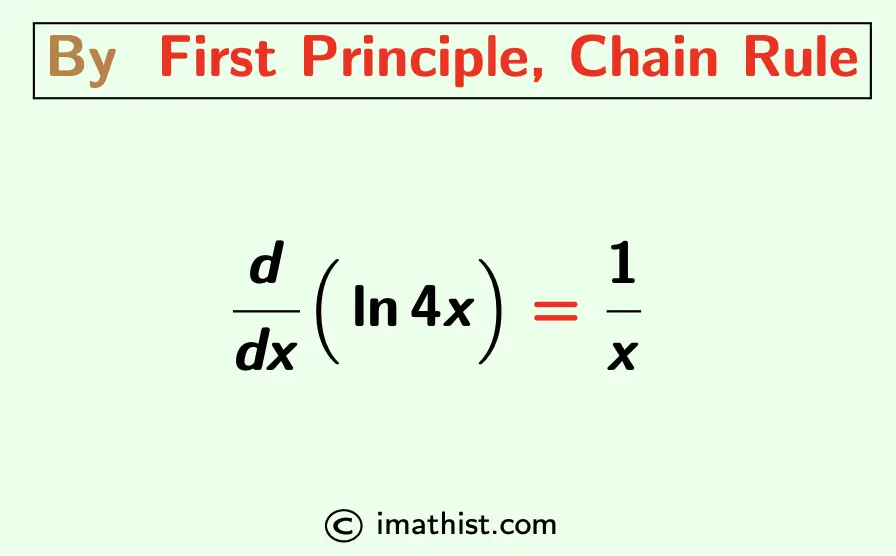The derivative of ln4x is equal to 1/x. The derivative of ln4x is denoted by d/dx(ln4x), and its formula is given by
$\dfrac{d}{dx}(\ln 4x)=\dfrac{1}{x}$.

Find the Derivative of ln4x
Answer: The derivative of ln(4x) is 1/x.
Explanation:
As ln4x = ln4 + lnx, the derivative of ln 4x is equal to
$\dfrac{d}{dx}$ (ln 4x) = $\dfrac{d}{dx}$(ln4 + lnx)
= $\dfrac{d}{dx}$ (ln 4) + $\dfrac{d}{dx}$ (ln x), by the sum rule of derivatives
= 0 + $\dfrac{1}{x}$ as ln4 is a constant and the derivative of a constant is 0.
= $\dfrac{1}{x}$.
So the derivative of ln4x is equal to 1/x.
Also Read: Derivative of lnx by First Principle
Derivative of ln(x+1) | Derivative of ln2x
Derivative of ln4x by First Principle
| The derivative of f(x) by first principle is given by the formula $\dfrac{d}{dx}(f(x))$ = limh→0 $\dfrac{f(x+h)-f(x)}{h}$. |
Let f(x) = ln4x.
So the derivative of ln4x by the first principle is
= limh→0 $\dfrac{\ln 4(x+h)-\ln 4x}{h}$
= limh→0 $\dfrac{\ln \Big(\dfrac{4x+4h}{4x} \Big)}{h}$, using the quotient rule of logarithms.
= limh→0 $\dfrac{\ln \Big(1+\dfrac{h}{x} \Big)}{h}$
| Let h/x = t, so that t→0 when h→0. Also, h=tx. |
= limt→0 $\dfrac{\ln \big(1+t \big)}{tx}$
= $\dfrac{1}{x}$ limt→0 $\dfrac{\ln \big(1+t \big)}{t}$
= $\dfrac{1}{x}$ × 1, as limx→0 ln(1+x)/x = 1.
= 1/x.
So the derivative of ln4x by the first principle is equal to is 1/x.
Read Also: Derivative of 1/lnx
What is the derivative of lnx2
Derivative of ln4x by Chain Rule
Let z=4x.
∴ dz/dx = 4.
So the derivative of ln4x by the chain rule is
$\dfrac{d}{dx}(\ln 4x)$
= $\dfrac{d}{dz}(\ln z) \times \dfrac{dz}{dx}$
= $\dfrac{1}{z}$ × 4
= $\dfrac{4}{4x}$ as z=4x.
= 1/x.
So the derivative of ln4x by the chain rule is 1/x.
FAQs
Q1: What is the derivative of ln4x?
Answer: The derivative of ln(4x) is equal to 1/x.
Q2: If y=ln4x, then find dy/dx.
Answer: If y=ln4x, then dy/dx =1/x.